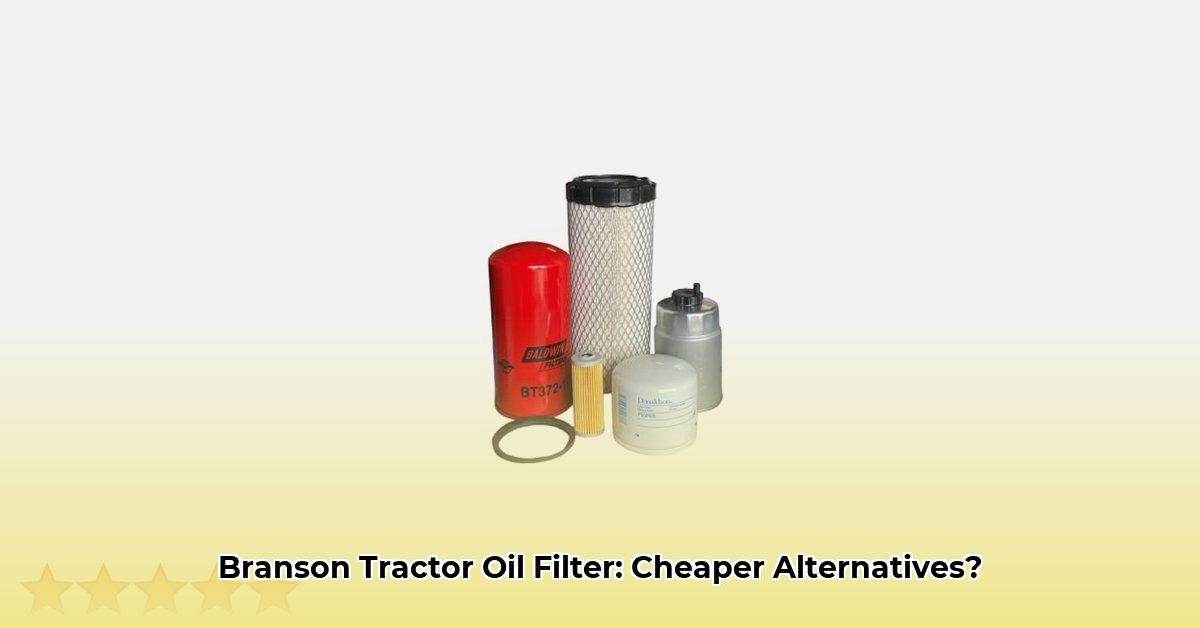
Finding the right oil and hydraulic filters for your Branson tractor shouldn't be a headache. This guide provides a step-by-step process for identifying the correct filters, whether you opt for Branson's OEM parts or explore cost-effective aftermarket alternatives. We'll cover everything from decoding your tractor's filter needs to choosing the best aftermarket filters and implementing a solid maintenance plan. For more information on tractor oil, check out this helpful resource: tractor oil guide.
Decoding Your Branson Tractor's Oil Filter Needs
First, you need to identify the correct filter for your specific Branson tractor model. Your owner's manual is your primary source of information; it will list the original equipment manufacturer (OEM) part number. This number is essential for finding compatible replacements. If you can't locate your manual, your local Branson dealer can assist you in obtaining this critical information. Why is this so important? A simple number helps avoid compatibility issues and costly mistakes.
Exploring the World of Aftermarket Filters: A Cost-Effective Option?
Once you have the OEM part number, you can research aftermarket filters—often a more economical choice. Numerous reputable companies produce filters that meet or exceed original specifications. Online resources, parts suppliers specializing in agricultural equipment, and tractor enthusiast forums provide valuable cross-reference charts. These charts simplify the process by matching various manufacturers’ filters with your OEM part number.
Navigating the Aftermarket Jungle: Choosing Wisely
Remember – not all aftermarket filters are equal. Substandard filters can compromise your tractor's performance and longevity. One key area to evaluate is the bypass valve in the hydraulic system. The OEM filter typically features a larger bypass valve. This is designed to prevent complete system shutdown even if the filter becomes heavily clogged, although some unfiltered fluid will bypass the filter. Aftermarket filters may use smaller bypass valves, potentially masking clogging issues and leading to premature component wear.
Weighing the Pros and Cons: OEM vs. Aftermarket Filters
| Feature | OEM Filter | Aftermarket Filter |
|---|---|---|
| Cost | Typically more expensive | Usually less expensive |
| Availability | Readily available from Branson dealers | Availability varies; readily available online and from many suppliers |
| Performance | Consistent, reliable performance | Performance varies by brand; choose reputable brands only |
| Warranty | Typically covered by tractor warranty | Warranty varies depending on the manufacturer |
| Bypass Valve | Larger bypass valve for safety and performance | Bypass valve size may vary; smaller valves can lead to performance issues |
Creating a Rock-Solid Branson Tractor Maintenance Plan
Regular oil filter changes are crucial for optimal engine health. Consult your owner's manual for the recommended service intervals. Neglecting these changes can cause significant engine wear and costly repairs. Consider investing in high-quality filters, either OEM or from a reputable aftermarket manufacturer, to protect your tractor's engine. This proactive approach is far less expensive than dealing with major engine problems later.
Beyond Oil: The Importance of Hydraulic System Filters
Don't overlook the hydraulic system filters! These are essential for the smooth operation of vital functions, including hydraulic lifts and steering. Because a poorly chosen hydraulic filter can significantly impact performance, especially in cold weather, exercise extra caution when selecting an aftermarket replacement. When in doubt, always prioritize the OEM filter or a confirmed, reputable aftermarket brand.
Finding Reliable Branson Tractor Oil Filter Cross-Reference Data
Numerous resources can aid your search: online forums dedicated to tractor owners share valuable tips; parts suppliers often offer comprehensive cross-reference charts; and your local farm equipment supplier can be a helpful source of information. Remember to thoroughly research and verify compatibility before making a purchase.
How to Choose the Best Aftermarket Hydraulic Filter for Your Branson Tractor
Choosing the correct hydraulic filter is critical. A faulty filter can lead to significant damage and expensive repairs.
Identifying Your Filter Needs
Start by identifying the specific filter you need to replace. Locate the exact part number on the filter itself or in your owner's manual. This number is crucial for determining a compatible replacement.
Cross-Referencing with Aftermarket Filters: A Step-by-Step Guide
- Enter the OEM part number: Use online filter cross-reference tools or your parts supplier's website.
- Compare specifications: Don’t solely rely on cross-references; verify that all specifications (size, flow rate, media type) align precisely with the original filter. Even small discrepancies can negatively impact your system.
- Check customer reviews: Look for independent reviews of the aftermarket filter to assess its performance and reliability.
- Consider the brand: Choose filters from well-established and reputable manufacturers known for delivering consistent, high-quality products.
Hydraulic Filter Considerations
- Bypass Valve: Ensure the bypass valve is appropriately sized to prevent complete system shutdown if the filter clogs, while still protecting your tractor's hydraulic system.
- Filter Media: The filter media should be compatible with your tractor's hydraulic fluid and operating conditions. Consult your owner's manual for guidance.
- Flow Rate: The filter's flow rate should match your tractor's hydraulic system requirements to ensure efficient operation without restriction.
The Final Word: Smart Choices, Happy Tractor
Prioritize obtaining the OEM part number, researching reputable aftermarket filters, exercising caution with hydraulic filters, and regularly monitoring your tractor's performance. Preventative maintenance saves you money in the long run. With careful planning and the right information, you can keep your Branson tractor running smoothly for years to come.